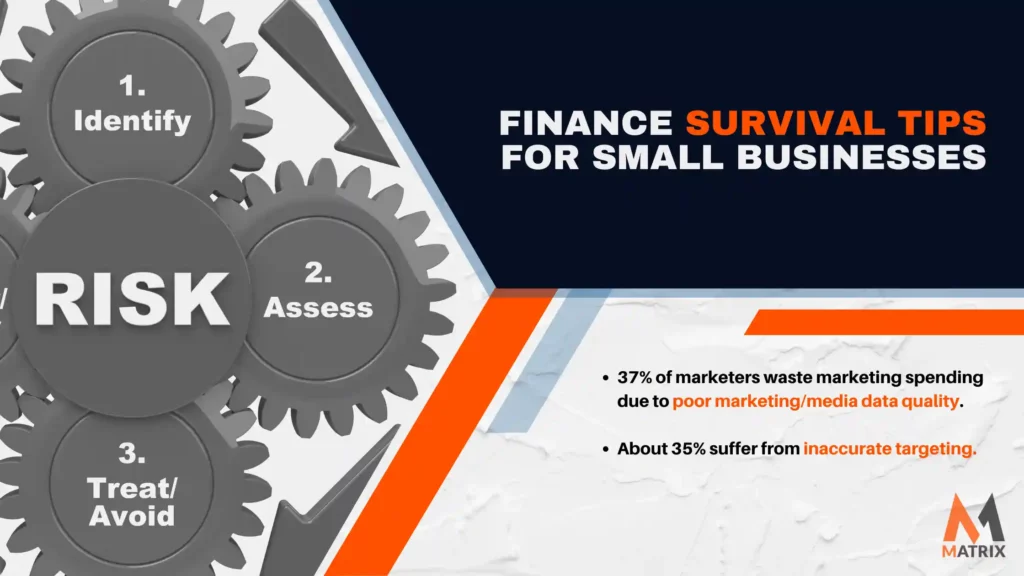Small businesses must use these finance survival tips during uncertain times
In today’s world, the only way to run a business successfully is to embrace that old saying, hope for the best but prepare for the worst. These words have never been more relevant, especially in light of COVID-19. But how do you get ahead if you’re a small business?
I get it. Not every business has a crisis management plan that’s easy to execute or the ability to set aside funds for an emergency. And for smaller businesses, the struggle is even greater.
Approximately 20% of new businesses fail during the first two years of opening, 45% during the first five years, and 65% during the first 10 years.
The pandemic has shown us just how vulnerable small businesses are. By September 2020, nearly 100,000 US-based businesses had closed their doors permanently. This trend echoed around the world, with SMEs being the worst affected.
With a small business, weathering storms in the economy or sudden changes in the market is much harder.
This is largely because of finances and access to extra funds or savings. Larger businesses can downsize and survive, but smaller ones don’t have that much to cut.
So, how do you avoid becoming a statistic?
How do you set up your finances to ensure that your small business can survive uncertain times?
We all know about having an emergency fund, but there are many ways to be proactive and future-proof your business against the unknown.
These tips can’t guarantee survival—ultimately, nothing can—but they can give you the best chances of seeing through whatever the world throws at you, pandemic or otherwise.
Assess Your Assets

“Your company’s most valuable asset is how it is known to customers.”
—Brian Tracy
Every business, no matter how big or small, has assets.
To future-proof your venture, compile a full inventory of assets so that you know what your business is worth. This should include fixed assets like your premises (if you own them), equipment, and machinery.
Liquid assets, such as cash in the bank and items you can sell off quickly, are very important to keep track of. These are the assets you can use in an emergency—once your emergency fund is depleted, that is.
With a clear idea of your asset value, you can approach lenders should you need a loan. You’ll have proof of collateral and can offer a clear idea of what your business is worth. You can also include intangible assets, such as goodwill, in your business’s value.
Goodwill is the value of your business’s good name and reputation and its recognition value with clients. It’s an important asset for any business with a customer base and has established a reputable brand name.
Understand Your Expenses
Once you’ve evaluated your assets, you need to know your monthly, quarterly, and annual expenses and where you can cut back. You may not control external factors such as the economy or changes in the market, but you can control your expenses.
When examining your expenses, you should divide them into categories—the most important are necessary and unavoidable, followed by those that are nice-to-have items.
The first category will be expenses like your mortgage or rent for premises, equipment and production tools, and employee wages. In the second category, you’ll put items like coffee in the break room and other supplies that you don’t need but contribute to positive work culture.
Once you have these categories, you can decide where to cut costs to boost your emergency fund before uncertain times hit.
You can also work out where to cut costs when you need to free up money to help your business stay afloat.
It’s not always about completely cutting out items. You can also look for cheaper options that save money but allow you to keep the nice-to-haves.
Additionally, you can chat to suppliers about bulk discounts or more favorable payment terms and reduce expenses in this way.
Grab this handly marketing budget guide and templates.
Rework Your Budget & Improve Your Cash Flow
“A Debt Problem Is, At Its Core, a Budgeting Problem.” —Natalie Pace
Once you’ve evaluated your expenses and worked out where you can cut costs, you need to rework your budget and assess where you can make changes in the future. Your cash flow is incredibly important, and there are often small stumbling blocks causing a bottleneck.
To prepare for the unknown, you need a clear picture of your financial situation—now and for the foreseeable future.
Ask yourself the following questions:
- Are you generating enough profits?
- Are your prices market-related?
- Are you paying too much for insurance and utilities?
- Are there any customers that owe you money?
- Do you have assets that are not generating income?
If you’ve answered yes to any of these questions, you need to take the following steps:
Complete a profit/loss assessment and determine how you can improve your profits and boost your bottom line.
- Conduct market research into your competitors. If you can increase or decrease prices to generate more revenue, do so.
- Do your homework. You may find cheaper insurance or ways to save on your utility bills.
- Keep close tabs on your accounts receivable. You may find several customers owe you the money you’ve been lax in pursuing.
- Do a complete stock take and sell any assets that are gathering dust. You can deposit the money you make from the sale into your emergency fund.
Monitor Local And Global Trends

While you can never truly predict what will happen, you can mitigate numerous potential problems by staying up to date about what’s happening in the world around you.
It’s important as a business owner to stay informed about economic trends and forecasts and the political activities in your region and the world around you.
Firstly, you should pay close attention to the trends impacting your primary target market and place of business. However, don’t just focus on the local events.
Global changes can trickle down your company because they can affect how your target market can spend.
Suppose you directly source any products or supplies from another state or country. In that case, you need to pay close attention to their economic and political swings and the trade route that brings your purchases to your business.
An interruption in the supply chain can lead to major expenses or leave you without a product. It’s an excellent idea to secure a backup supplier you can call on in an emergency. This allows you to continue operations without interruption.
The last thing you want to do is have to refund customers for stock that will not arrive anytime soon.
Secure Credit In Advance
A loan or a line of credit is often seen as bad; you fail to run your business.
This is a very narrow-minded mindset that may do more harm than good.
In hard times a small cash injection could be the difference between staying open and shutting up shop. A loan is a lifesaver if a crisis looks short-lived or you need emergency funds to get back up and running.
To prepare for future disasters, establish a good relationship with your bank. Ensure that you settle any lines of credit when they’re due and that you always make loan payments on time.
Suppose you don’t have any existing lines of credit. Set up a credit facility when you are in good standing. In doing this, you won’t have to desperately apply for credit when times are tough and stand the chance of possibly getting declined.
It’s also important to ensure that your credit score is good. Good business credit will help you to increase your limit, should you need access to more funds.
Again, it’s much better to ensure that it is in order when your cash flow is strong rather than waiting for times to get hard before considering how to get an injection of cash quickly.
Keep Updating Your Financial Plan

You should keep adapting a financial plan as the world around you shifts, and your company changes over time.
It would be best to go back to it time and again as you learn new things or as your goals shift. This is quite normal and healthy for a business.
When you draw up your financial plan, ensure you include plenty of contingencies for future events, especially unforeseen ones. It would be best if you also looked for assistance with this part of your planning.
More than one person can brainstorm possible events or changes that could harm your business.
Talk to financial planners, other business owners, and even your employees—they’ll have great insights into your business because they are a part of it.
By keeping your financial plan up to date, you can see gaps that need plugging and what you need to do to continue to prepare for the future.
In Summary
According to the U.S. Bureau of Labor Statistics, 20% of new businesses fail during the first two years of operation, and 45% during the first five years. However, these stats don’t account for the pandemic.
Now more than ever, it’s important for businesses to prepare for the unexpected. In the current economic climate, failing to plan could well be planning to fail.
We’re listening.
Have something to say about your thoughts on financial planning?
Share it with us on Facebook, Twitter, or LinkedIn.
General FAQs
What is a financial plan?
What is financial planning?
Financial planning outlines how your money, investments, and other assets can help you meet your financial goals.
Why is financial planning important?
Financial planning is a step-by-step approach to meeting one’s life goals. A financial plan acts as a guide as you go through life’s journey. It helps you control your income, expenses, and investments to manage your money and achieve your goals.
What is a small business budget?
A business budget is an overview of your business’ finances. It outlines key information on your finances’ current state (including income and expenses) and your long-term financial goals.

